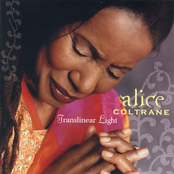Translinear Light

Biography
Translinear Light marks Alice Coltrane's return to recording after a 26-year hiatus. Her last outing, the live and marvelous Transfiguration, was issued by Warner Bros. in 1978. Coltrane's son, saxophonist and composer Ravi, produced the disc; he plays saxophones on five of the set's 11 cuts and contributes percussion to two others. Other musicians here include Charlie Haden, James Genus, Jeff Watts, Jack DeJohnette, and son Oran who plays alto in duet with her on one selection Translinear Light...
Translinear Light marks Alice Coltrane's return to recording after a 26-year hiatus. Her last outing, the live and marvelous Transfiguration, was issued by Warner Bros. in 1978. Coltrane's son, saxophonist and composer Ravi, produced the disc; he plays saxophones on five of the set's 11 cuts and contributes percussion to two others. Other musicians here include Charlie Haden, James Genus, Jeff Watts, Jack DeJohnette, and son Oran who plays alto in duet with her on one selection Translinear Light opens with a reprise of Alice's "Sita Ram," originally recorded for 1971's Universal Consciousness. Ms. Coltrane plays her signature style on the Wurlitzer organ with DeJohnette playing a synth drum and Ravi contributing organic percussion. Her long lines of individually played notes are set against a droning chorded backdrop, and are instantly recognizable. There is no speculation in her playing; an authoritative, deeply Eastern melodic sensibility saturates her improvisation. The shimmering piano intro of the traditional "Walk With Me," with its deep gospel roots set against a modal framework, brings the ancient hymn into the modern world and traces the artist's steps from her Detroit roots in the church to playing blues to the edge of the jazz vanguard without slipping into dissonance. It strolls back into a gently swinging lyric that almost literally sings atop the rhythm section of Watts and Genus before moving back to the open minor mode. The title cut is a ballad with Ravi on soprano and Haden and DeJohnette in support. The interplay betweenAlice and Ravi from the tune's slowly evolving head into the knotty modal chords and single-note runs that spark the dialogue, is simply breathtaking. The pair wind around and through one another as the rhythm section offers an insistent chromatic foundation. Though she has recorded them before, there are new readings of her late husband's "Crescent" and "Leo"; both offer new harmonic dimensions and emotional interpretations on the originals. She doesn't revisit them so much as recontextualize them musically. Ms. Coltrane plays piano on the former and a driven, fiery Wurlitzer on the latter, making the track a blistering maelstrom of activity. DeJohnette's drumming on these cuts is wildly incisive and canny. Ravi's soloing and accompaniment here — and indeed throughout the album — make this his most inspired performance on record. "Triloka," a duet with Haden, is sublime; a deeply meditative and lyrical work, it is especially poignant after the workout of "Leo." Ultimately, Translinear Light offers a poetic, well-rounded, and utterly convincing portrait of the artist's return to the public eye, at the top of her game. Translinear Light is a major entry in Coltrane's catalog. It is a defining, aesthetically brilliant statement from a master composer, improviser, and player. If ever there were a candidate for jazz album of 2004, Translinear Light is it. Read more on Last.fm. User-contributed text is available under the Creative Commons By-SA License; additional terms may apply.
